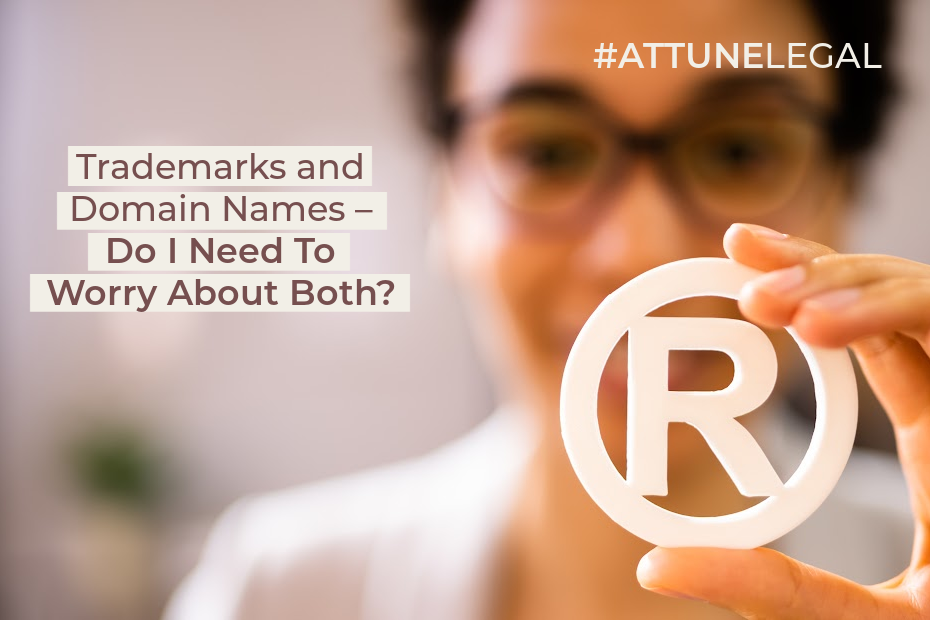Trademarks and Domain Names – Do I Need To Worry About Both?
Most small businesses are aware of trademarks but often do nothing about them. You only need a website, a domain name and a storefront, right? As we discuss in our latest Attune Legal blog, perhaps not.
When starting a new business, it’s crucial to consider trademarks and domain names to protect your venture’s branding. Many small businesses are aware of trademarks but often overlook their significance.
It’s a common misconception that a trademark is the same as a business name, company name, or domain name. While it’s possible to trademark your domain name, it’s not always guaranteed.
Consider this: words commonly found in domain names, such as ‘doctor’, ‘health’, or ‘sports’, cannot be trademarked. Therefore, securing all aspects of your new venture’s branding is essential as you start your business planning.
Your Business, Your Domain
Acquiring your domain name is the first step in establishing an online presence for your business.
When choosing a domain name, it’s crucial to ensure that it’s available while also considering trademarks, business names, and your business’s social media accounts.
Using someone else’s trademark for your business name, domain name, or social media account, even if it’s not identical to their trademark, could result in legal action from the existing trademark owner.
Use It Or Lose It
Additionally, if you own a registered trademark, there is a “use it or lose it” policy.
Failure to use your trademark can lead to the amendment or cancellation of its registration under s.92 of the Trade Marks Act. The section in Part 9 of the TM Act is titled ‘Part 9 – Removal of TM from Register for Non-Use.’
Genuine or ‘Bona Fide’ Use
A genuine or ‘bona fide’ trademark use is required to maintain its validity.
In Imperial Group Ltd v. Phillip Morris & Co [1980] 1 FSR 72 (a British Case), a “launch” of a new brand in the staff canteen was not a bona fide commercial use of the trade mark in question.
The use requirement exists to prevent people from registering trademarks with no intention of using the mark themselves but in the hope of selling it to the original creator.
Suppose an opposition to a trade mark is filed via the procedure in Part 9 in any proceedings relating to an opposed application. In that case, it is then for the opponent to rebut (in summary):
Any allegation that, on the day on which the application for the registration of the trade mark was filed, the applicant for registration had no intention in good faith:
(i) to use the trade mark in Australia; or
(ii) to authorise the use of the trade mark in Australia; or
(iii) to assign the trade mark to a body corporate for use by the body corporate in Australia.”
“The Case About Burgers”
Interestingly, a current case in the media (the case about burgers) involves (in part) a similar issue. One party has lodged a Non-Use Application with the Registrar of Trademarks, which has been referred to the Federal Court under section 94 of the Trademarks Act.
This is a tactical move (if the trademark is removed, the other party loses some grounds for infringement).
The case has undergone many hearings and appearances and has yet to be settled as of the time of writing this article.
What is certain is that it will end up costing someone large sums (probably in the millions) just in court costs.
If an infringement is found, the sky’s the limit.
Seek Advice Before You Start
Understanding the importance of trademarks and domain names is crucial for protecting your business and its branding. If you get it wrong, you could potentially face very expensive court proceedings. Before obtaining a trademark or embarking on a new business venture, it is always important to seek professional advice. Our commercial law team at Attune Legal can assist you in the process of obtaining a trademark when starting a new business venture. To chat with our team, get in touch with us here.

